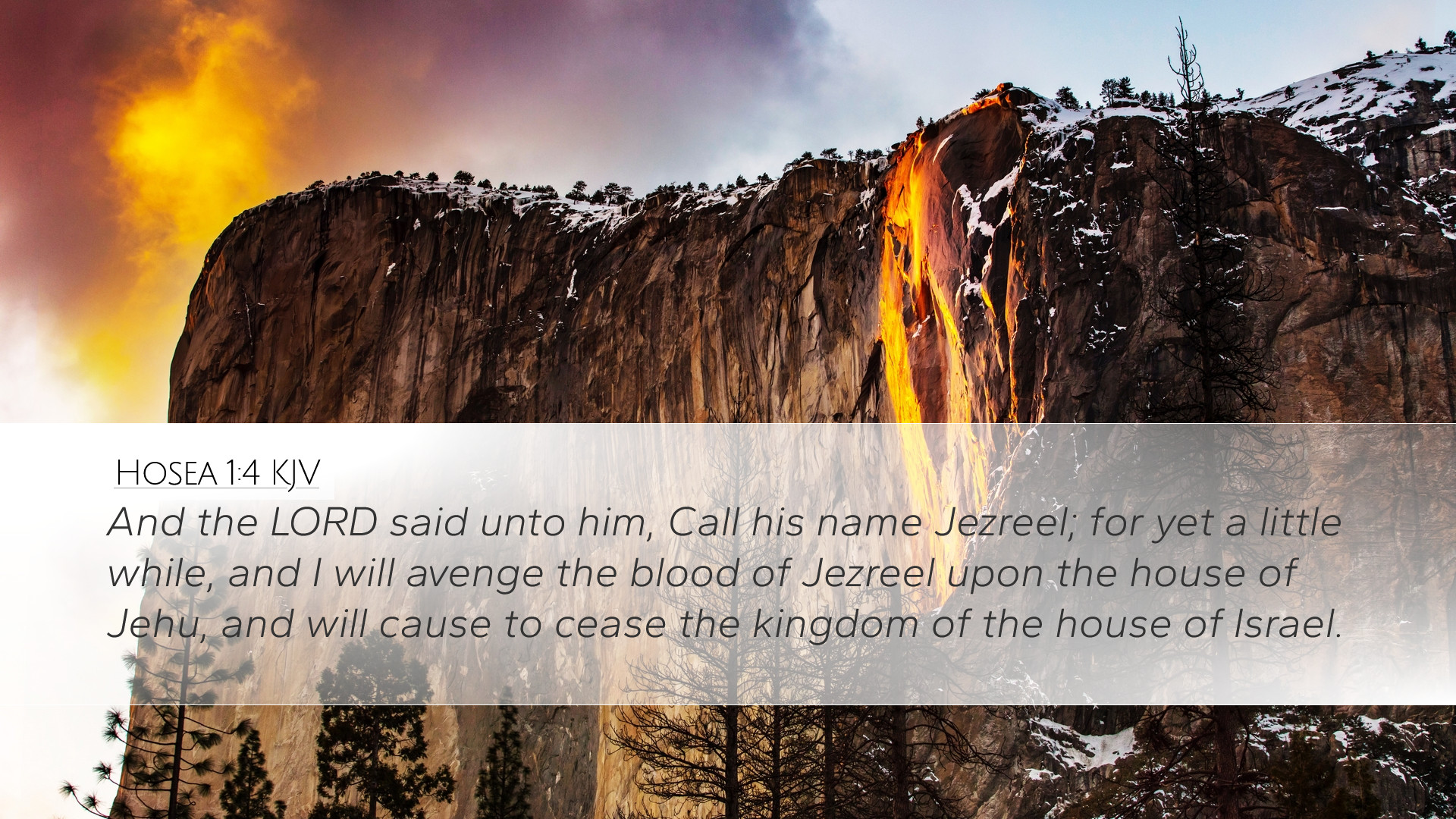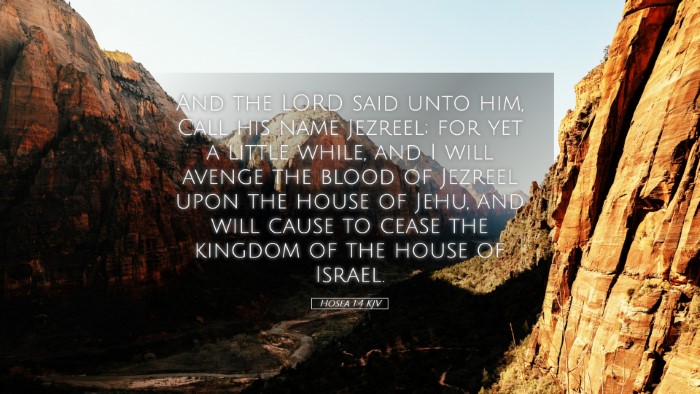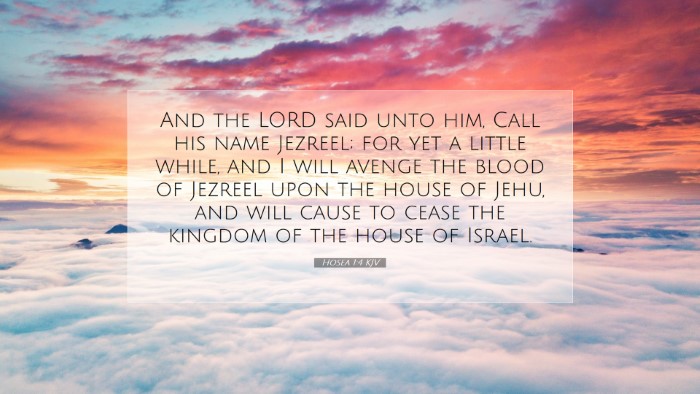Old Testament
Genesis Exodus Leviticus Numbers Deuteronomy Joshua Judges Ruth 1 Samuel 2 Samuel 1 Kings 2 Kings 1 Chronicles 2 Chronicles Ezra Nehemiah Esther Job Psalms Proverbs Ecclesiastes Song of Solomon Isaiah Jeremiah Lamentations Ezekiel Daniel Hosea Joel Amos Obadiah Jonah Micah Nahum Habakkuk Zephaniah Haggai Zechariah MalachiHosea 1:4
Hosea 1:4 KJV
And the LORD said unto him, Call his name Jezreel; for yet a little while, and I will avenge the blood of Jezreel upon the house of Jehu, and will cause to cease the kingdom of the house of Israel.
Hosea 1:4 Bible Commentary
Commentary on Hosea 1:4
Verse Analysis: Hosea 1:4 states, "Then the LORD said to him, 'Call his name Jezreel; for yet a little while, and I will avenge the blood of Jezreel on the house of Jehu, and I will put an end to the kingdom of the house of Israel.'
Contextual Background
The Book of Hosea addresses the tumultuous relationship between God and Israel, using the prophet’s marriage to Gomer as a vivid illustration of Israel's unfaithfulness. The name Jezreel carries historical and theological significance, invoking memories of bloodshed and divine judgment.
Insights from Matthew Henry
Matthew Henry emphasizes the significance of the name Jezreel in this verse. He notes that it refers to the valley of Jezreel, a location associated with several pivotal events in Israel’s history, particularly the violent actions perpetrated by Jehu against the house of Ahab. This name symbolizes not only the historical memory of bloodshed but also God’s intention to bring justice to these acts:
- Henry points out that naming the child Jezreel signifies the impending judgment on the house of Jehu, which, despite its initial obedience to God, fell prey to idolatry and moral decay.
- The phrase "I will avenge the blood of Jezreel" indicates God’s active role in justice, highlighting that His patience has limits.
Insights from Albert Barnes
Albert Barnes provides a deeper exploration of Jezreel as a prophetic name that embodies the coming judgment on Israel:
- Barnes notes that the actions of Jehu, while initially ordained by God to cleanse Israel from idolatry, resulted in further transgression. Rather than leading the people back to God, Jehu's lineage continued in sin, and thus, the judgment falls upon them.
- He also elucidates that the phrase "I will put an end to the kingdom of the house of Israel" foreshadows the eventual downfall of the northern kingdom, reinforcing God’s sovereignty over the affairs of nations and His ultimate authority in matters of judgment.
Insights from Adam Clarke
Adam Clarke's commentary expands on the implications of divine judgment present in this verse:
- Clarke posits that the name Jezreel serves as a reminder of God’s justice and the consequences of Israel’s unfaithfulness. He highlights the prophetic foreshadowing of doom—a dire warning to the people of Israel about their refusal to return to God.
- He further interprets "I will avenge the blood of Jezreel" as indicative of God’s passion for justice. Clarke emphasizes that God’s vengeance is part of His righteousness, responding to human iniquity with necessary judgment.
Theological Implications
Reflecting on the commentaries, several theological themes arise in Hosea 1:4:
- Divine Justice: The verse presents God as a just judge, steadfast in His commitment to punish sin. This reflects a consistent biblical theme where God's patience coexists with His holiness.
- Human Accountability: Jehu's lineage serves as a case study on the broader topic of accountability. Even actions taken under divine mandate may lead to severe consequences if followed by unfaithfulness and sin.
- The Role of Prophecy: The name Jezreel, as given to Hosea's child, underscores the prophetic role of names and events in scripture as intentional points conveying divine messages to the people.
Application for the Faith Community
For pastors, students, and scholars, Hosea 1:4 provides rich material for reflection and application:
- Encouragement to Repentance: As with Israel, the church today is reminded of the seriousness of sin and the importance of turning back to God to avoid divine judgment.
- Understanding God’s Character: Reflecting on the nature of God as both loving and just highlights that His invitations for repentance come with the weight of His desire for righteousness.
- The Call to Bold Prophecy: Believers are encouraged to speak truthfully and boldly about the nature of sin in their communities, just as Hosea did, warning against complacency and encouraging a return to faith.
Conclusion
Hosea 1:4 serves as a poignant reminder of the relationship between God’s judgment and human actions. By studying the implications of the name Jezreel, we grasp the weight of Israel's transgressions and the seriousness of God’s response. As we engage with the commentaries, we are reminded that the themes of justice, accountability, and repentance are not only historical but are relevant in our current faith journeys.


